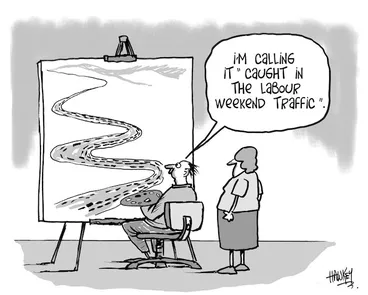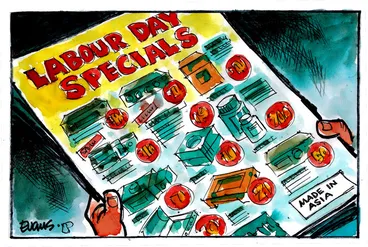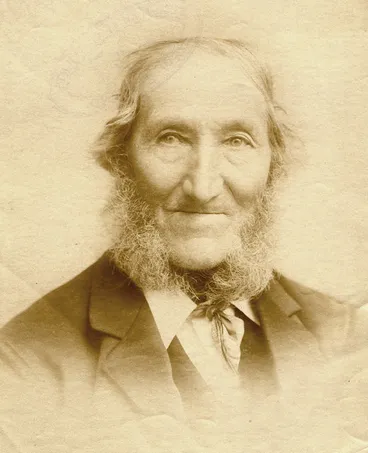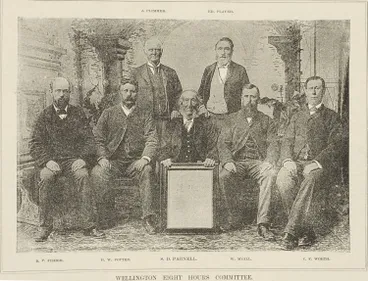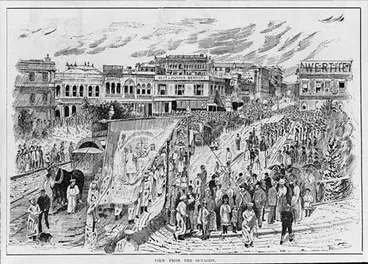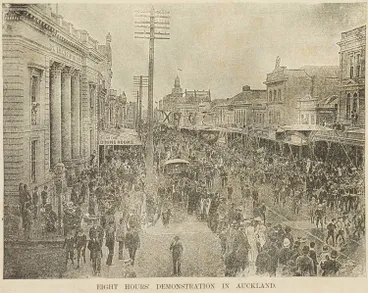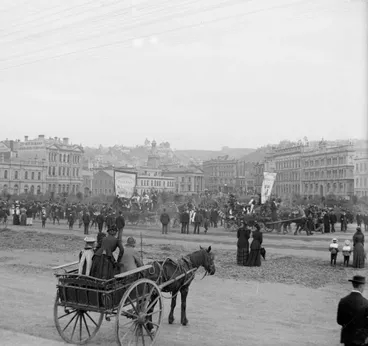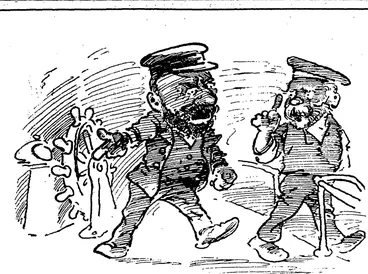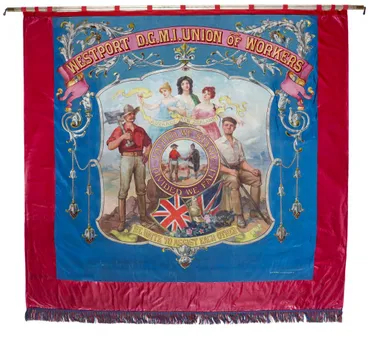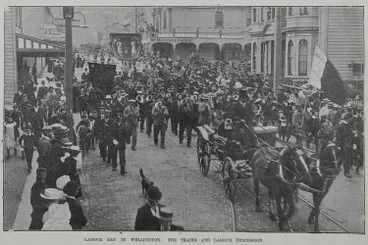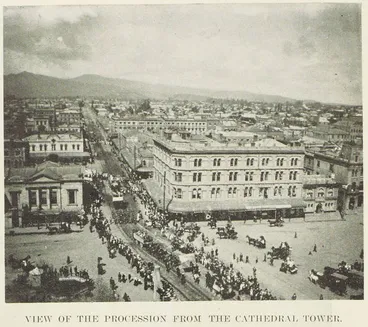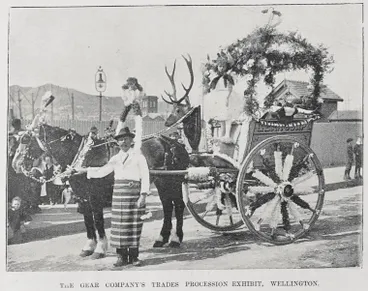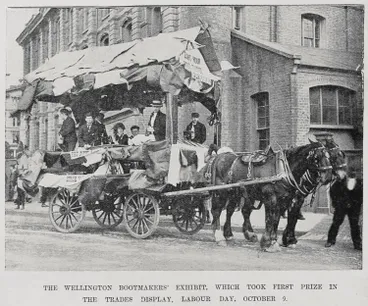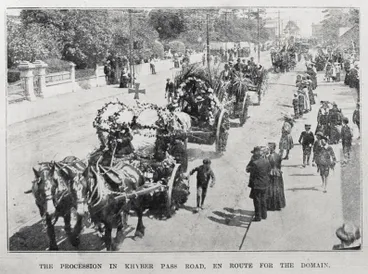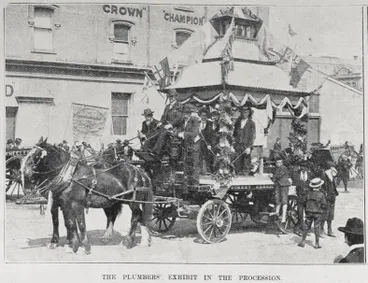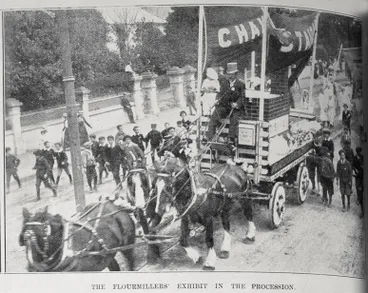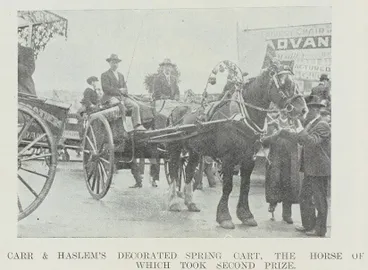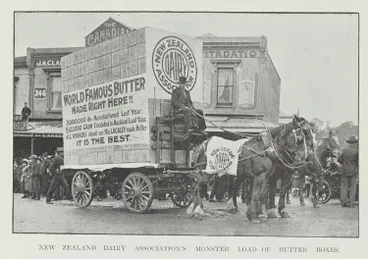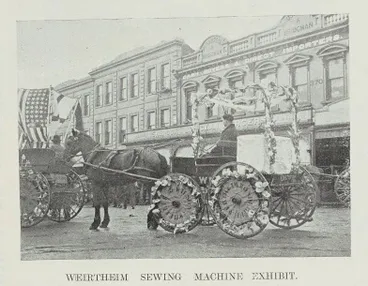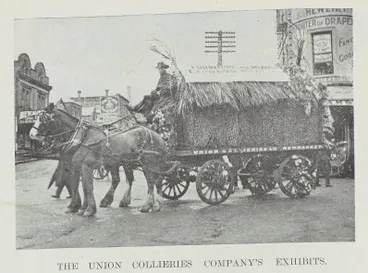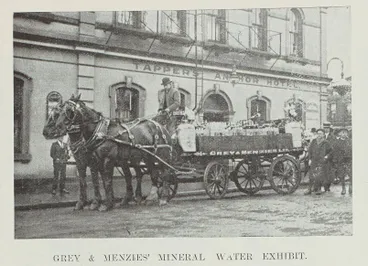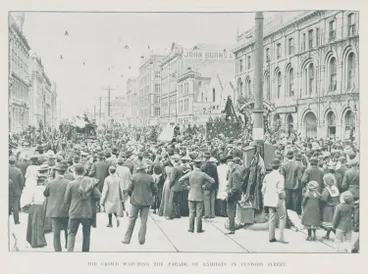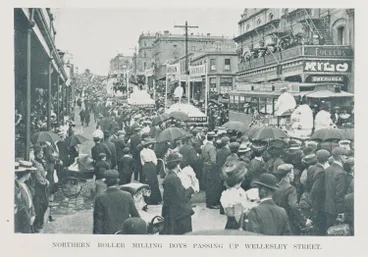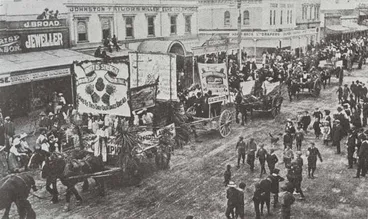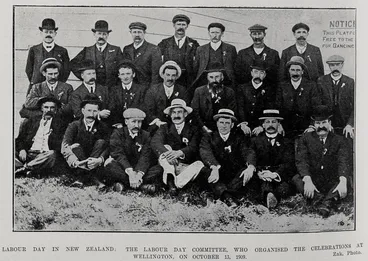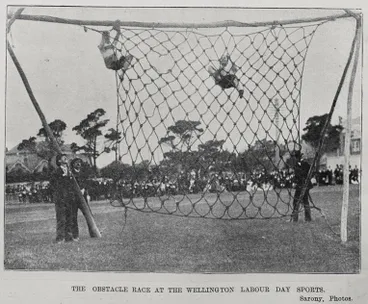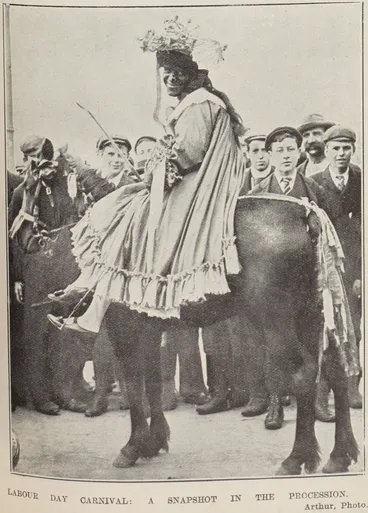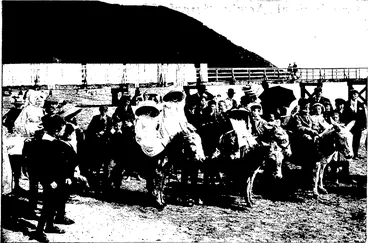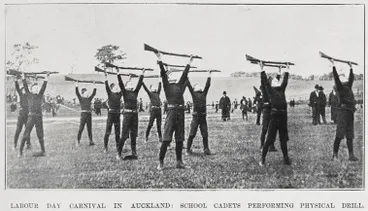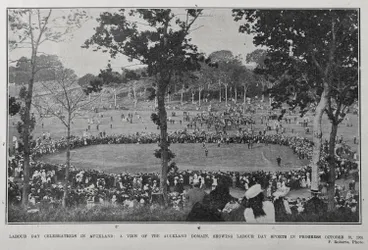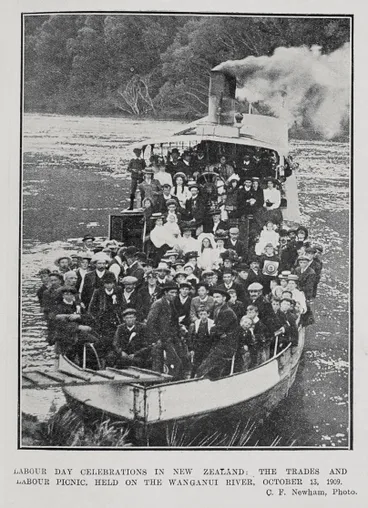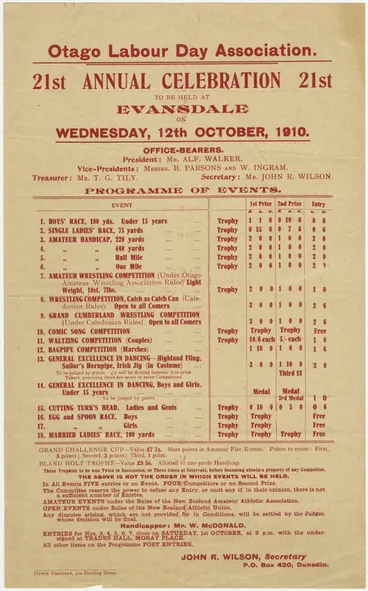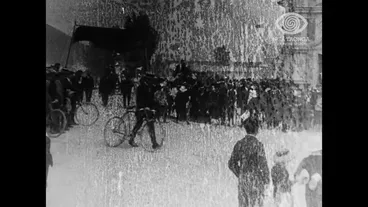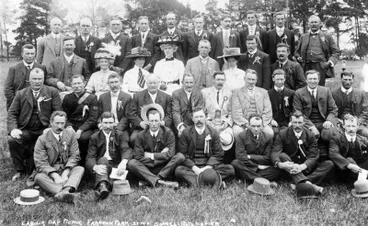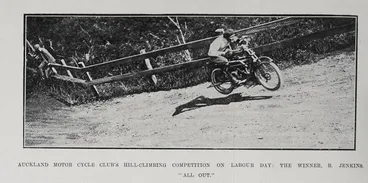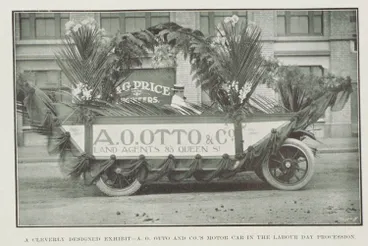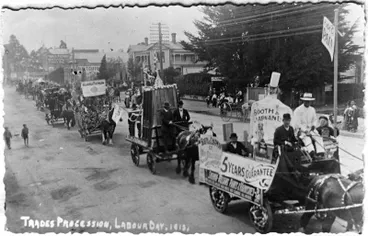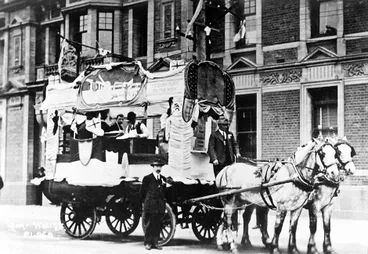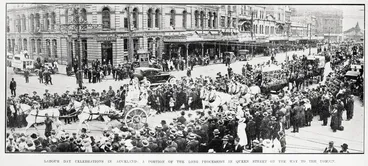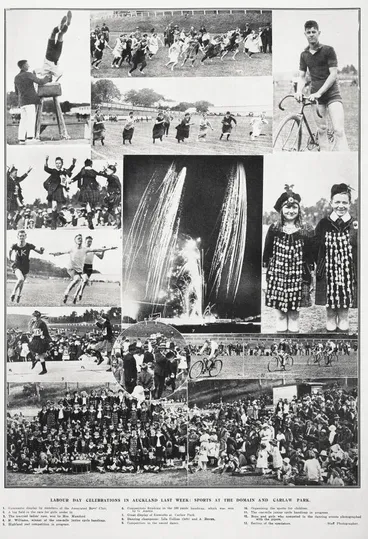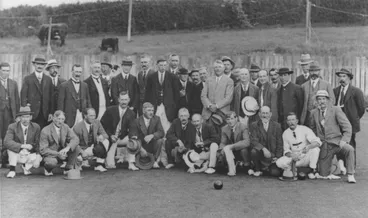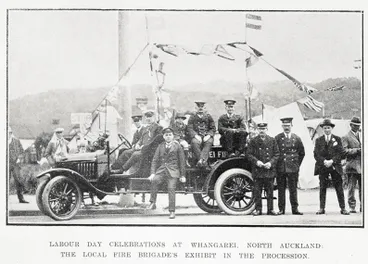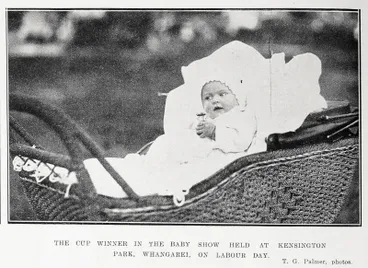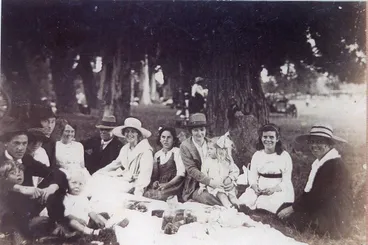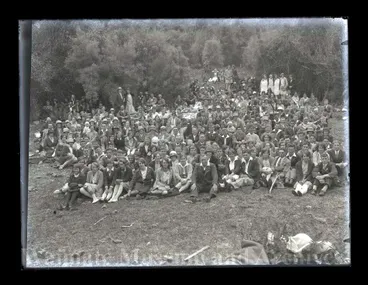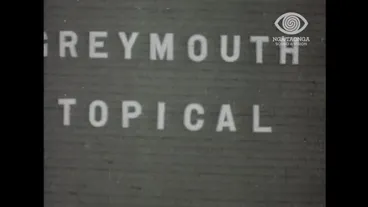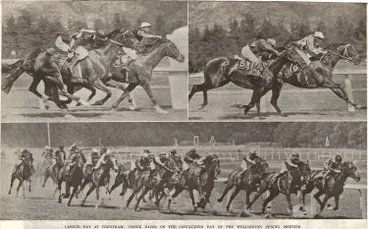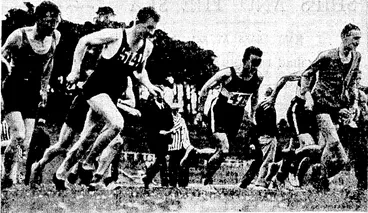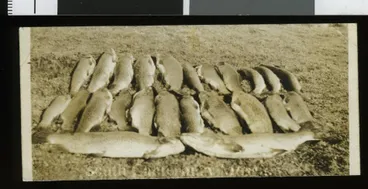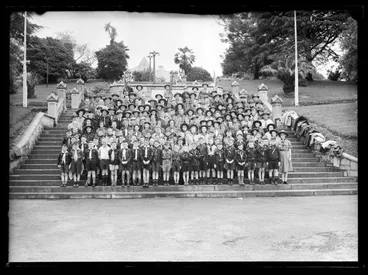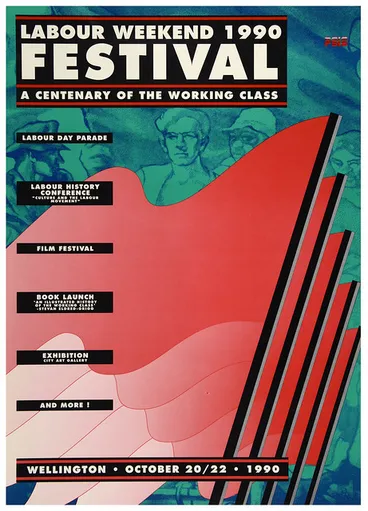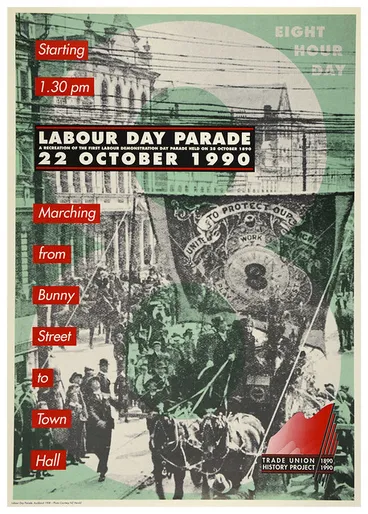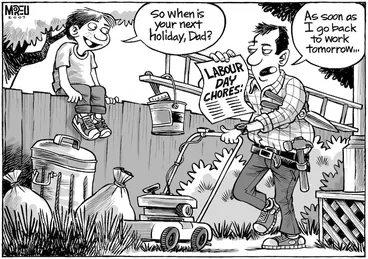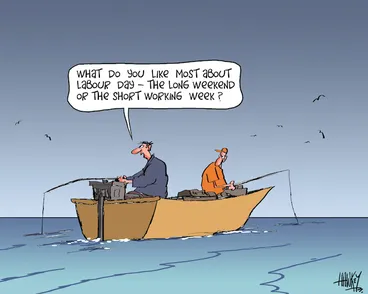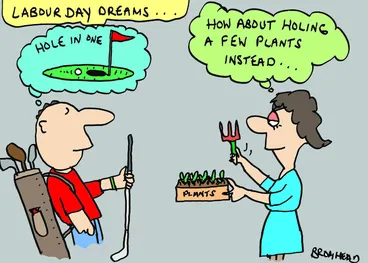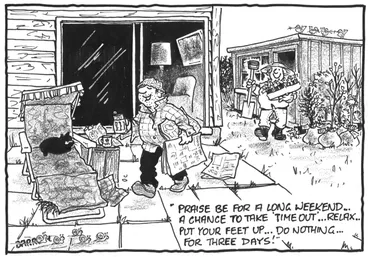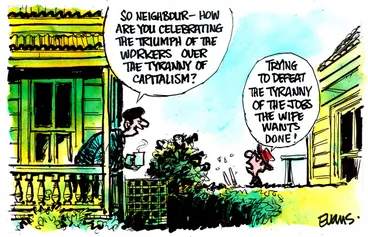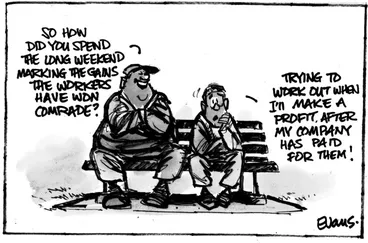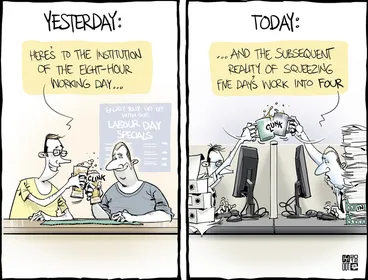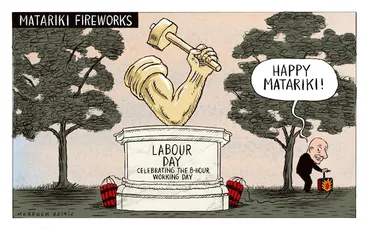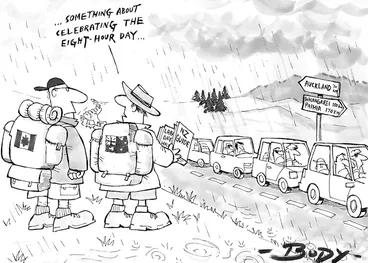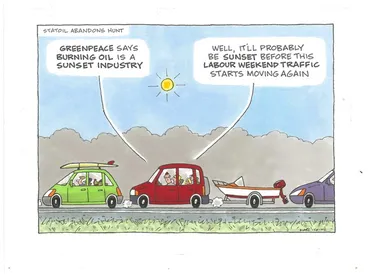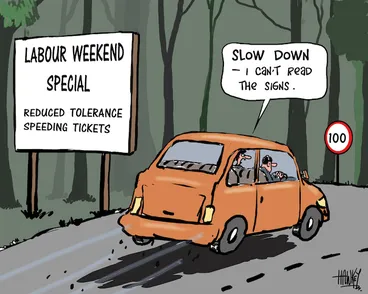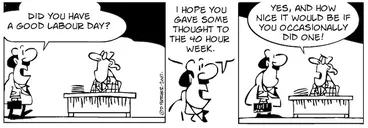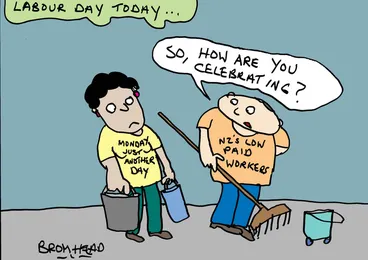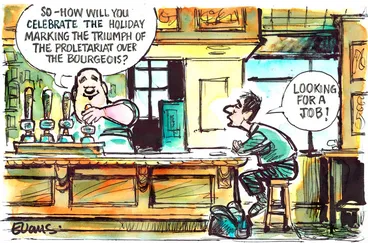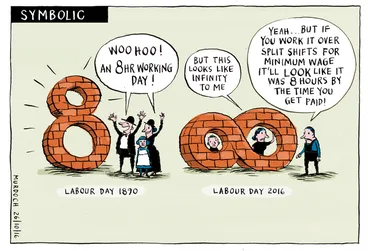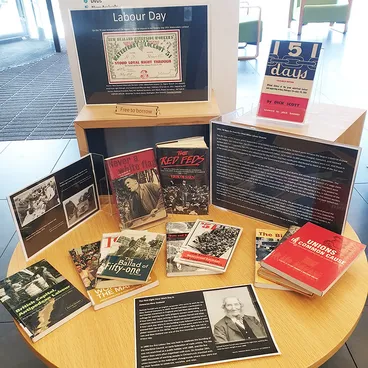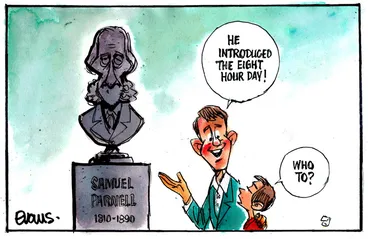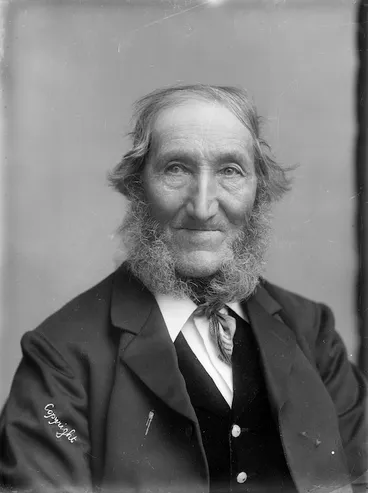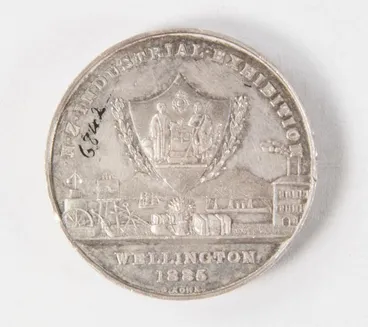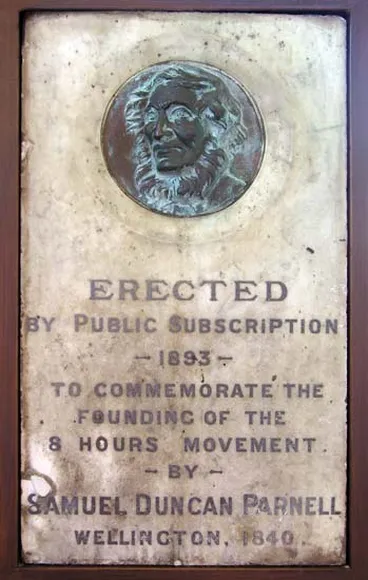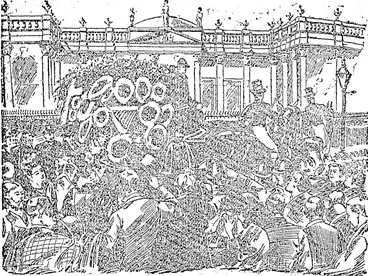Labour Day - then and now
A DigitalNZ Story by Zokoroa
A look back in time to the beginnings of Labour Day on 28 October 1890 as a commemoration for the 8-hour working day and what it signifies today.
Labour Day, Holidays, Workers, Employment, Trade unions, Unions, Recreation
Labour Day commemorates the campaign by workers for an eight-hour working day which began in the 1840s. It was first celebrated in NZ on 28 October 1890 when parades were held by trade union members and supporters in the main centres. The Labour Day Act of 1899 created a statutory public holiday on the second Wednesday in October, which was first celebrated in 1900. Under the Public Holidays Act of 3 December 1910, the holiday was 'Mondayised' and held on the fourth Monday in October beginning in 1911. In various other countries, the first day of May is commemorated as the annual holiday celebrating the union movement and is called May Day. Nowadays, Labour Day is regarded in diverse ways, as captured by cartoonists and news media.
Read more: 'Labour Day', URL: https://nzhistory.govt.nz/politics/labour-day (Ministry for Culture and Heritage), updated 27-Oct-2020)
Back then since 1890
Labour Day processions with 8-hour working day banner were held around NZ by trade unionists
Auckland Libraries
Nowadays
Labour Day = day off work for holidaying at home or travelling
Alexander Turnbull Library
Labour Day = Household chores
Tremain, Garrick, 1941- : Dad, who called it Labour Day? Otago Daily Times [24 October 2004]
Alexander Turnbull Library
Labour Day = 3-day traffic jam over holiday weekend & road toll
"I'm calling it 'Caught in the weekend traffic'". 23 October, 2007
Alexander Turnbull Library
Labour Weekend = sales
Evans, Malcolm Paul, 1945- :Labour Day Specials. 22 October 2012
Alexander Turnbull Library
8-hour working day movement began 1840
Wellington carpenter Samuel Duncan Parnell is credited with starting the eight-hour working day movement in NZ in 1840. When sailing from London to NZ, Parnell had met shipping agent George Hunter on board. After arriving in NZ on 8 Feb 1840, Hunter asked him to build a store on Lambton Quay. Parnell would agree only on the condition that the working day was a maximum of eight hours and said he'd be available from 8am.
1840: Wellington carpenter Samuel Parnell advocated for 8-hour working day
Samuel Parnell, father of the eight-hour day movement
Archives New Zealand Te Rua Mahara o te Kāwanatanga
1889: Letter by Edward Player to the Evening Post acknowledging role of Samuel Parnell
SAMUEL D. PARNELL. (Evening Post, 04 December 1889)
National Library of New Zealand
Why 8 hours?
Samuel Parnell was said to have argued,
"There are twenty-four hours per day given us; eight of these should be for work, eight for sleep, and the remaining eight for recreation and in which for men to do what little things they want for themselves."
Dividing the day into three equal eight-hour parts echoed the phrase coined by Welsh manufacturer and labour rights activist Robert Owen in 1817: “Eight hours labor, eight hours recreation, eight hours rest.” [See: Herbert Roth. 'Parnell, Samuel Duncan', Dictionary of New Zealand Biography, first published in 1990. Te Ara - the Encyclopedia of New Zealand, https://teara.govt.nz/en/biographies/1p7/parnell-samuel-duncan]
Otago movement for an 8-hour working day
Newspaper articles conjectured that whilst Parnell led the way in Wellington, there was also a movement underway in Otago. The Otago Association adopted 8 hour working day in 1845.
Article arguing the case for Otago movement beginning before the Wellington movement
THE EIGHT HOURS' SYSTEM. (Ashburton Guardian, 23 December 1890)
National Library of New Zealand
The Otago Association adopted 8 hour working day in 1845
THE EIGHT HOURS SYSTEM WHERE WAS IT STARTED, AND BE WHOM ? (Evening Post, 22 October 1891)
National Library of New Zealand
Counter-argument for Wellington
The Eight-hour Day. (Otago Witness, 08 September 1909)
National Library of New Zealand
Eight hours movement gains momentum
Samuel Parnell canvassed new migrants arriving at the Post of Nicholson to resist those employers who wanted to impose longer working hours. This led to a meeting of Wellington workmen in October 1840 where, on the motion of William Taylor, seconded by Edwin Ticehurst, they resolved to work eight hours a day, from 8am to 5pm.
A settler recounts being advised of 8-hour working day on his arrival in June 1841
THE EIGHT HOUKS SYSTEM. (Evening Post, 15 January 1885)
National Library of New Zealand
Following an investigation into the employment of women, the Employment of Females Act was passed in 1873 making it illegal to employ women for more than eights hours a day. Five years later, the Report of the Royal Commission Appointed to Inquire Into the Working of The Employment of Females Acts (AJHR, 1878, 2, H-2, p. 2) stated that women had expressed their gratitude for the Act as the common belief was that women could not "combine together as workmen do in their trade union to protect themselves and limit the hours of labour". The Act was later extended in 1881 to also apply the eight hour working day to children.
The Employment of Females Act of 1873 made it illegal to employ women for more than 8 hours in any one day
71 Employment of Females Act 1873
The University of Auckland Library
In 1878, a Royal Commission found women were appreciative of the Act as they were unlikely to form a union like men
EMPLOYMENT OF FEMALES ACTS (REPORT OF THE ROYAL COMMISSION APPOINTED TO INQUIRE INTO THE WORKING OF THE).
National Library of New Zealand
The Employment of Females and Others Act of 1881 extended 8 hours working day to include children
23 Employment of Females and Others Act 1881
The University of Auckland Library
During 1880s, the eight-hour working day had become the custom for tradesmen and labourers. However, some workers were employed for longer hours, including seamen, farm labourers, and hotel, restaurant and shop employees. [See: Herbert Roth. 'Parnell, Samuel Duncan', Dictionary of New Zealand Biography, first published in 1990. Te Ara - the Encyclopedia of New Zealand, https://teara.govt.nz/en/biographies/1p7/parnell-samuel-duncan] Beginning in 1882, a series of Bills were submitted to Parliament during 1880s to legalise the eight-hour day, but were unsuccessful.
In 1882, the first Eight Hours Bill submitted to Parliament was unsuccessful as were other Bills submitted during 1880s
EIGHT HOURS' BILL. (Colonist, 31 May 1882)
National Library of New Zealand
Trade union campaign introduced parades: 1890 - 1899
A trade union campaign to force the Government to restrict working hours by law rather than custom led to the introduction of a parade on 28 October 1890. The floats represented different trades, and the banners carried union slogans. Various Bills continueed to be submitted to Parliament to legalise the eight-hour day, but failed to gain parliamentary approval.
1890: Eight Hour Day Committee including Parnell met in October to organise first Labour Day celebrations
Wellington Eight Hours Committee
Auckland Libraries
Lists the members of the 1890 Committee
EIGHT-HOUR DAY (Evening Post, 20 October 1936)
National Library of New Zealand
28 Oct 1890: First trade union parade to campaign for 8-hour working day to be set in law
First Labour Day procession, Dunedin
Manatū Taonga, the Ministry for Culture and Heritage
1890: Newspaper article about the first Labour Day observance in Wellington
Report of first Labour Day, 1890
Manatū Taonga, the Ministry for Culture and Heritage
The case for an Eight Hours Bill
The case for an fight hours Bill.* - The Pamphlet Collection of Sir Robert Stout: Volume 86
Victoria University of Wellington
1891: Report on the Eight Hours Bill
REPORT OF THE LABOUR CONFERENCE ON THE VARIOUS LABOUR BILLS SUBMITTED TO PARLIAMENT BY THE GOVERNMENT; ALSO, MR. W. HUTCHISON'S EIGHT HOURS BILL.
National Library of New Zealand
Hours of labour in other countries in 1892
HOURS OF LABOUR. (Evening Post, 16 January 1892)
National Library of New Zealand
1892: Trades Council gained consent of Minister of Labour W. Hutchinson to present Eight Hours Bill to Parliament
The Eight Hours Bill. (Star, 09 July 1892)
National Library of New Zealand
Proposed exclusions to Bill include domestic servants and under 16 year olds
EIGHT HOURS BILL. (Taranaki Herald, 13 July 1892)
National Library of New Zealand
The 1892 Bill was voted against 16 to 4
THE EIGHT HOURS BILL. (Tuapeka Times, 31 August 1892)
National Library of New Zealand
1893: Another Eight Hours Bill was introduced
Eight Hours' Bill. (Colonist, 17 May 1893)
National Library of New Zealand
Annual processions of trade unionists continued
Dunedin Labour Day parade, 1894
Manatū Taonga, the Ministry for Culture and Heritage
1896: Implications of 8 hour days for sailors
Angry Captain : What the deuce do you mean by leaving the wheel before you are relieved'? Do you want to wreck the ship ? Law-Abiding Sailor: Can'...
National Library of New Zealand
1898: A further Eight Hours Bill was presented
EIGHT HOURS' LEAGUE. (Auckland Star, 27 August 1898)
National Library of New Zealand
1898: Description of Labour Day celebrations
LABOUR DAY. (Evening Post, 12 October 1898)
National Library of New Zealand
Banner of Westport District Gold Miners' Industrial Union of Workers made in 1899
Trade union banner
Museum of New Zealand Te Papa Tongarewa
Labour Day Act 1899
Although the Government was reluctant to enforce the eight-hour working day by law, it did pass the Labour Day Act 1899 to establish a statutory public holiday on the second Wednesday in October, which was first celebrated in 1900.
1899: Government established a statutory holiday: Labour Day
17 Labour Day Act 1899
The University of Auckland Library
Labour Day holiday: 1900 - 1909 (Celebrated 2nd Wednesday in October)
A. Parades
The floats continued to represent different trades, and the banners carried union slogans.
1900: Procession in Wellington
Labour Day in Wellington; the trades and labour procession
Auckland Libraries
1901: Wellington
Labour Day in Wellington: Some features of the trades procession, October 9, 1901
Auckland Libraries
1901: Wellington
Labour Day in Wellington: Some features of the trades procession, October 9, 1901
Auckland Libraries
1902: Auckland
Labour Day procession in Khyber Pass Road en route for the Auckland Domain, 8 October 1902
Auckland Libraries
1902: Flour millers float at Auckland
The flour millers float in the Labour Day procession in Auckland, 8 October 1902
Auckland Libraries
1904: Carr & Haslam’s decorated spring cart & horse which took 2nd prize at Auckland
Carr & Haslem's decorated spring cart, the horse of which took second prize
Auckland Libraries
1904: New Zealand Dairy Association’s float of butter boxes at Auckland
New Zealand Dairy Association's float of butter boxes
Auckland Libraries
1904: Union Collieries Company’s exhibit in Auckland
Union Collieries Company's exhibits
Auckland Libraries
1904: Grey & Menzies’ mineral water exhibit at Auckland
Grey & Menzies' mineral water exhibit
Auckland Libraries
1905: Northern Roller Milling Company, Auckland
Northern Roller Milling boys passing up Wellesley Street
Auckland Libraries
Labour Day In New Zealand
Auckland Libraries
B: Sporting & recreational activities
The parades were followed by a mix of leisure activities.
1901: Obstacle race
Labour Day in Wellington: Some features of the trades procession, October 9, 1901
Auckland Libraries
1903: Auckland Carnival procession
Labour Day carnival: a snapshot in the procession
Auckland Libraries
1903: Children riding on donkeys at picnic in Wellington
CHILDREN RIDING ON THE DONKEYS. SNAPSHOT ON THE OCCASION OP THE LABOUR DAY PICNIC AT -L. Daroux, photo. DAY'S BAY, WELLINGTON. (Otago Witness, 25 N...
National Library of New Zealand
1904: Auckland Carnival & school cadets
LABOUR DAY CARNIVAL IN AUCKLAND: SCHOOL CADETS PERFORMING PHYSICAL DRILL
Auckland Libraries
1906: Sports in Auckland Domain
LABOUR DAY CELEBRATION IN AUCKLAND: A VIEW OF THE AUCKLAND DOMAIN, SHOWING LABOUR DAY SPORTS IN PROGRESS OCTOBER 10, 1906
Auckland Libraries
C. Increased momentum for Labour Day observance
1906: Railways introduce 8 hour day
Eight Hours Per Day. (Thames Star, 05 April 1906)
National Library of New Zealand
1907: Differing views on date Labour Day is held
Labour Day. (Feilding Star, 10 October 1907)
National Library of New Zealand
1908 Act consolidated the establishment of the Dept of Labour and Labour Day
93 The Labour Department and Labour Day Act, 1908
The University of Auckland Library
1910: 21st celebration poster in Otago
Otago Labour Day Association. 21st Annual Celebration poster
University of Otago
Film (1910): Labour Day parade followed by sports in Gisborne
LABOUR DAY IN GISBORNE
Ngā Taonga Sound & Vision
Public Holidays Act (3 Dec 1910): Labour Day to move from 2nd Wednesday to 4th Monday in October
Under the Public Holidays Act of 3 Dec 1910, Labour Day to be celebrated on fourth Monday in October
71 Public Holidays Act 1910
The University of Auckland Library
Labour Day since 1911: Held 4th Monday in Oct
1911: Motorcycling in Auckland
Auckland Motor Cycle Club's Hill-Climbing Competition On Labour Day
Auckland Libraries
1912: Car converted to a motorised float for Auckland parade
A cleverly designed exhibit - A.O. Otto and Co's motor car in the Labour Day procession
Auckland Libraries
Labour Day parades less of a public feature by 1920s
By the 1920s, Labour Day parades became less of a public feature. Instead, Labour Day was increasingly regarded as just another holiday with a range of recreational pursuits, sports and conferences taking place over the three-day weekend.
By 1920s, Labour Day parades were held less as a public feature in parts of NZ
Labour Day celebrations in Auckland: a portion of the long procession in Queen Street
Auckland Libraries
Increasingly, Labour Day was seen as just another public holiday with a range of recreational activities
Labour Day Celebrations In Auckland Last Week: Sports at the Domain and Carlaw Park
Auckland Libraries
1922: Local Fire Brigade's exhibit at Whangarei
Labour Day celebrations at Whangarei, North Auckland: the local fire brigade's exhibit in the procession
Auckland Libraries
1922: Baby show held at Kensington Park, Whangarei
The cup winner in the baby show held at Kensington Park, Whangarei, on Labour Day
Auckland Libraries
c.1925: Families having a picnic in Farndon Park, Clive, on Labour Day
Labour Day Picnic at Farndon Park
Hastings District Libraries
1928: Film of the horse harness / trots races held at Greymouth on Labour Day
GREYMOUTH TOPICAL
Ngā Taonga Sound & Vision
1929: Labour Day horse racing at Trentham, Wellington
Labour day at Trentham: three races on the concluding day of the Wellington spring meeting
Auckland Libraries
May Day held overseas on 1 May also began to be observed by some workers
Some trades had also begun promoting May Day (1 May) as a day off work which is observed in several countries. May Day, also called 'Workers' Day' or 'International Workers' Day', commemorates the struggles and gains made by the working class and the labour movement. (See: Britannica: May Day). Coal miners in the Waikato district, for example, had been observing May Day as a workers' holiday since the early 1920s.
May Day (1 May) which is a workers' holiday overseas, also began to be observed by some trades, including Waikato miners
THE WAIKATO MINES (Evening Post, 02 May 1924)
National Library of New Zealand
Increasing focus from 8-hour day to a 40-hour week by 1930s
By 1930s, the 8-hour day became the standard in many industries and there was a changing focus of Labour Day celebrations from processions to sports, horse racing and picnics. However, many workers were required to work longer than five days a week. This led to an increasing focus on introducing the forty-hour week and the Industrial Conciliation and Arbitration Amendment Act 1936 was introduced. Although the 8-hour working day is not set out in that Act or subsequent legislation, it’s implicit as a maximum 40-hour, five-day work week is the norm for employment agreement. See: Minimum Wage Act 1983 and the Employment Relations Act 2000.
By 1930, there was a changing focus of Labour Day celebrations to sports, horse racing & picnics rather than processions
LABOUR DAY (Evening Post, 24 October 1935)
National Library of New Zealand
In 1936, the Industrial Conciliation and Arbitration Act introduced 40 hour week as many workers had to work 6 or 7 days
6 Industrial Conciliation and Arbitration Amendment Act 1936
The University of Auckland Library
1936: Marathon at Wellington on Labour Day
Evening Post" Photo. START OF THE HOLIDAY MARATHON.—Runners at Newtown Park on Labour Day after the starter had dispatched them on the. 26 miles 38...
National Library of New Zealand
1937: Fishing at Ashburton on Labour Day
Fish caught on Labour weekend at Lake Clearwater, Ashburton
South Canterbury Museum
In 1983, the Minimum Wage Act 1983 set out a maximum 40-hour, five-day work week as the norm for employment agreements
Pay and the minimum wage [electronic resource].
National Library of New Zealand
Labour Weekend Festival, 1990
Archives New Zealand Te Rua Mahara o te Kāwanatanga
Poster celebrating 100 years of Labour Day Parades, 1990
Archives New Zealand Te Rua Mahara o te Kāwanatanga
In 2000, the Employment Relations Act states forty as the maximum number of hours (exclusive of overtime) in one week
Employment Relations Act 2000
Wikipedia
Labour Day sentiments of today captured in cartoons
"So when is your next holiday, Dad?" "As soon as I go back to work tomorrow..." 22 October, 2007
Alexander Turnbull Library
"What do you like most about Labour Day - the long weekend or the short working week?" 25 October 2010
Alexander Turnbull Library
Labour Day dreams... "Hole in one." "How about holing a few plants instead..." 25 October 2010
Alexander Turnbull Library
Evans, Malcolm Paul, 1945- :Labour Day. 26 October 2014
Alexander Turnbull Library
Evans, Malcolm Paul, 1945- :'So how did you spend the long weekend?...' 23 October 2012
Alexander Turnbull Library
Smith, Hayden James, 1976- :'Here's to the institution of the eight-hour working day...' 23 October 2012
Alexander Turnbull Library
In April 2022, National Party proposed the scrapping of Labour Day to make up for cost of new Matariki Day in June
Union movement disagreed with National's suggestion, saying it showed the party is out of touch with working people
Alexander Turnbull Library
Labour Weekend news: Weather, Sales, Traffic queues & Road accidents
Is it safe to swim in Auckland this Labour Weekend?
Radio New Zealand
Retailers Report A Rise In Weekend Spending
Radio New Zealand
Garden centre shopping, Labour Day 2005
Manatū Taonga, the Ministry for Culture and Heritage
Big holiday sales entice shoppers into stores
Radio New Zealand
"... Something about celebrating the eight-hour day..." 22 October 2004
Alexander Turnbull Library
Statoil - Labour weekend traffic
Alexander Turnbull Library
"Slow down - I can't read the signs." 22 October 2010
Alexander Turnbull Library
What's happened to the battle for the 8-hour day?
Cartoon: 23 Oct 2007
"Did you have a good Labour Day? I hope you gave some thought to the 40 hour week." "Yes, and how nice it would be if you occasionally did one" 23 ...
Alexander Turnbull Library
Cartoon: 20 Oct 2013
Bromhead, Peter, 1933-:Labour Day today... 28 October 2013
Alexander Turnbull Library
Cartoon: 27 Oct 2013
Evans, Malcolm Paul, 1945- :Labour Weekend Holiday. 27 October 2013
Alexander Turnbull Library
Labour Day celebrated with a display at Christchurch City Libraries, 2021
Labour Day
Christchurch City Libraries
Tributes to Samuel Parnell
After Samuel Parnell died on 17 December 1890, thousands of people attended his public funeral. He is buried at Bolton Street Memorial Park in Wellington and his grave is part of the memorial trail. (See: Friends of Bolton Street Cemetery)
Samuel Parnell
Alexander Turnbull Library
Samuel Parnell (19 Feb 1810 - 17 Dec 1890) became known in NZ as the father of the eight-hour day
Samuel Parnell
Alexander Turnbull Library
New Zealand Industrial Exhibition of Wellington medal awarded to Samuel Parnell in 1885
New Zealand Industrial Exhibition of Wellington medal
Museum of New Zealand Te Papa Tongarewa
This plaque was originally mounted at the Wellington Public Library in 1890
Samuel Parnell memorial
Manatū Taonga, the Ministry for Culture and Heritage
DEATH OF MR. S. D. PARNELL. THE FOUNDER OF THE EIGHT HOURS SYSTEM. (Evening Post, 17 December 1890)
National Library of New Zealand
THE FUNERAL OF ME. PARNELL. THE PROCESSION PASSING THE OLD PAKLIAMENT HOUSE, DUBLIN. (Auckland Star, 19 December 1891)
National Library of New Zealand
1891: Poem as a tribute to Parnell
Zealandia's Uncrowned King (Observer, 14 February 1891)
National Library of New Zealand
1891: Memorial Committee formed
THE S. D. PARNELL MEMORIAL. (Star, 16 June 1891)
National Library of New Zealand
THE PARNELL MEMORIAL. (Evening Post, 18 June 1891)
National Library of New Zealand
FIND OUT MORE
Labour Day: Our first national public holiday
Radio New Zealand
Samuel Duncan Parnell, The Founder of the "Eight Hours System" - The Pamphlet Collection of Sir Robert Stout: Volume 69
Victoria University of Wellington
Trade union banners
Manatū Taonga, the Ministry for Culture and Heritage
2010: Mark Derby interviewed about the 8 hour day movement, Labour Day and the life of Samuel Parnell
Mark Derby
Radio New Zealand
NZ On Screen: Labour Day collection: 20 films on Kiwi working life
Labour Day collection
Services to Schools
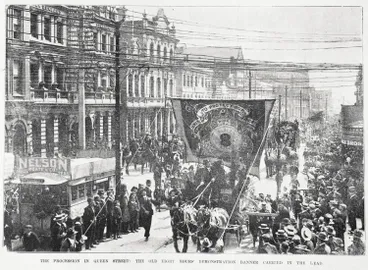
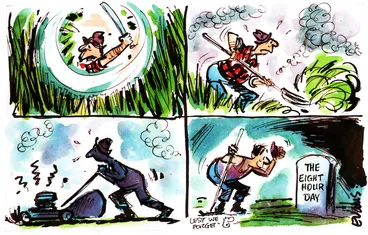
![Tremain, Garrick, 1941- : Dad, who called it Labour Day? Otago Daily Times [24 October 2004] Image: Tremain, Garrick, 1941- : Dad, who called it Labour Day? Otago Daily Times [24 October 2004]](https://images.digitalnz.org/LQCAFfVu-gk34rxmXrkJzpF6hWc=/368x0/https%3A%2F%2Fndhadeliver.natlib.govt.nz%2FNLNZStreamGate%2Fget%3Fdps_pid%3DIE942751)
